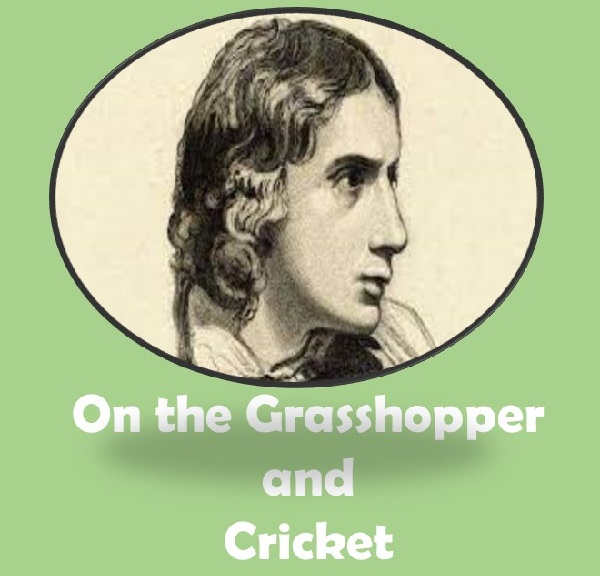On the Grasshopper and Cricket
About the Poet
John Keats was born on October 31, 1795, in London, England. He started his school at Enfield Academy and developed an interest in literature from there. He studied medicine but was not satisfied. Later, he became close to Percy Bysshe Shelley, William Wordsworth, and other popular English poets. His first volume of poetry, ‘Poems’ appeared in 1817. He next volume, ‘Endymion: A Poetic Romance’ was published in 1818. He writes the poem ‘Isabella’ which is about a woman who falls in love with a man having low social status against her family’s wish.
Keats’ famous odes are ‘Ode on Indolence’, ‘Ode on Melancholy’, ‘Ode to a Nightingale’, ‘Ode to Psyche’, ‘Ode on a Grecian Urn’ and ‘To Autumn’. His ode ‘To Autumn’, published in 1820, made him a matured romantic poet. This famous poet met the death on February 2, 1821 at the age of 26 due to tuberculosis.
About the Poem
In the poem ‘On the Grasshopper and Cricket’, the poet John Keats celebrates the beauty of nature. He finds beauty in summer as well as in winter. These two seasons seem to create a continuous natural cycle. The grasshopper’s song represents the voice of summer and the cricket’s song symbolizes the voice of winter. Both the insects are the representative voices of nature. They offer a soothing effect on the extreme climate. The grasshopper’s song stabilizes the extreme heat during summer with pleasing music and the cricket does the same (increase warmth) during winter. The poem has the rhyme scheme ‘abba abba cde cde’.
Summary of the Poem
The speaker believes that the music of the earth is always alive. During summer, all the singing birds are tired because of the heat of the sun and take shelter under the shadow of trees. But even if the birds don’t sing, the song of nature goes on. The voice of the grasshopper who runs from hedge to hedge, can be still heard. The grasshopper goes on singing joyously. When it is tired, it rests beneath some weed.
The poet again expresses his belief that the song of the earth never ends. During winter, in the frosty evening the birds are silent. The song of a cricket which breaks this silence can be heard. The song increasingly spreads warmth every moment. The person who is half-asleep, mistakes the song of the cricket for the grasshopper’s coming from the grassy hills.
Two insects perform their responsibility properly. They have been personified in the poem. In spite of extreme climates, they carry on their responsibility of singing songs. These two insects are the voice of the constant joyous mood of nature.



0 Comments
Please, do not enter any spam link in the comment box.